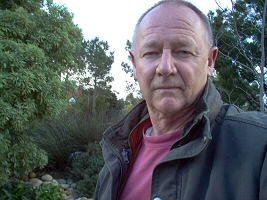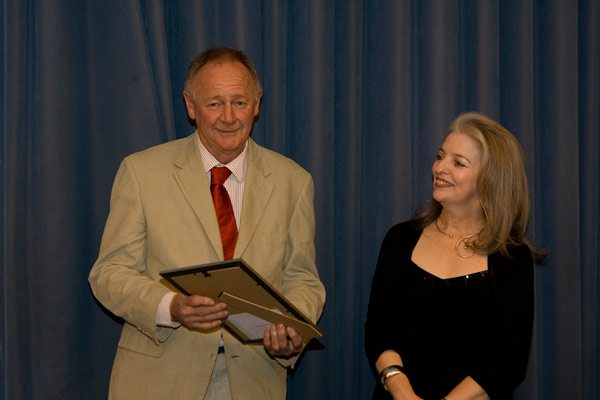Michiel Heyns

Author of English Literature
Professor at the English Department, Stellenbosch University, 1987-2003
Michiel Heyns was born on 2 December 1943 in Stellenbosch.
He attended school in Thaba ĎNchu, Kimberley and Grahamstown, and studied at
the universities of Stellenbosch (B.Comm., MA, D. Litt.) and Cambridge (MA).
He served as professor of English at Stellenbosch University from 1987 until
2003, when he took early retirement to be a full time author.
He is at present teaching creative writing in the USA, as O'Brien Visiting
Professor at the University of Tulsa, but normally lives in Somerset West,
South Africa.
Michiel Heyns reviews regularly for the Sunday Independent.
Quote: One must imagine Sisyphus happy. (Albert Camus)

Books24 Prize giving 2012
Photo by Alwyn van Zyl
Awards:
Pringle Prize for a Literary Article 1992-3 for Another World Altogether?, The Knight's Tale and the Cape Times Theoria 80 (1992), 1-23.
English Academy's Pringle Prize for Reviewing 2006
Sunday Times Fiction Award 2007 - with Marlene van Niekerk for the translation of Agaat and
Sol Plaatje-prys vir vertaling 2008
Herman Charles Bosman Award for English Fiction 2009 for Bodies Politic
Herman Charles Bosman Prize 2012 for best English fiction
and the Sunday Times Literary Award 2012 for Lost Ground
Critical Studies:
Expulsion and the Nineteenth-Century Novel: The Scapegoat in English Realist Fiction (Oxford University Press, 1994)
Novels:
The Childrenís Day, Jonathan Ball, 2002
Translated into Afrikaans as Verkeerdespruit
The Reluctant Passenger, Jonathan Ball, 2003
The typewriter's tale, Jonathan Ball, 2005
Bodies politic, Jonathan Ball, 2008
Lost Ground, Jonathan Ball, 2011
Invisible Furies, Jonathan Ball, 2012
A Sportful Malice, Jonathan Ball, 2014
I am Pandarus, Jonathan Ball, 2017
 Translations:
Translations:
Marlene van Niekerk, Agaat, 2006
Marlene van Niekerk, Memorandum: A Story with pictures, 2006
Tom Dreyer, Equatoria
Chris Barnard, Bundu
[From The Childrenís Day]
Having had the protected childhood that was the only kind possible in
Verkeerdespruit, I was used to piecing together my understanding of the great
world from literature in the broadest sense, that is, almost anything that I
could find to read in an unliterary community. Steve, I learnt from old copies
of Die Huisgenoot in Mr Welthagenís barberís shop where I reluctantly went once
a month to have my head scraped with his blunt clipper, was not unique. 'He's a
ducktail,' I announced one day as we were standing around outside Steyl's cafe
hoping Steve would arrive. 'You can see it from the way he combs his hair.'
'What's a ducktail?' Louis challenged in a truculent tone intended to
neutralise the humiliation of having to admit ignorance.
'They're people who drive around on motorbikes and comb their hair like
Steve's,' I said, conscious of a certain circularity of definition. This was
not lost on Louis. 'Big deal,' he said. 'So what?'
'They live in Johannesburg,' I added, 'and they have Sheilas. The Sheilas are
women who smoke.'
Louis wasn't going to be trapped into another admission of ignorance. 'Then where's Steve's Sheila?' he demanded, and to myself I had to concede that Louis
had seized the initiative. To him I said 'In Johannesburg, I suppose. Sheilas
live on the streets.'
'So? There are streets here, aren't there?' and Louis gesticulated indignantly towards the dusty waste of Voortrekker Street.
I laughed scornfully. 'And what do you think a Sheila would do on Voortrekker
Street?'
'Just what she does on the Johannesburg streets, I suppose,' Louis countered.
'A street's a street, isn't it?'
Looking at Voortrekker Street in the meagre light of an unexuberant spring, its one cafe and two shops, its petrol pump and its hotel, its ragged eucalyptus trees, I shook my head. 'No. A street's not a street,' I said, though without quite understanding what it was that I was trying to say. 'No Sheila could live
on this street.'
The Children's Day is in Afrikaans vertaal as Verkeerdespruit - na my mening een van die aangrypendste romans oor 'n Suid-Afrikaanse jeug.
Melt Myburgh, LitNet (2008)
[From The Reluctant Passenger]
I'm fond of reading, but sometimes find it difficult to concentrate on very long books. My friend Gerhard says my attention span is adjusted to the sonnet rather than to the nineteenth-century novel, but I donít seem to find poetry very interesting either: thereís such a lot of unassimilated emotion around for so little reason, as far as I can see. Gerhard says the point of the sonnet is exactly that it tidies up the emotion, but Iím not sure that uncontrollable passion succumbs that easily to a few quatrains and a rhyming couplet. I once saw a man transporting his Rottweiler in a shopping trolley through a No Dogs Allowed area: the beast was clearly well trained, and stayed put, but you could see that all it really wanted to do was chew the wheels off all the trolleys in the universe. That's the sonnet.
Text by Michiel Heyns, July 2003
![]() www.StellenboschWriters.com © Rosemarie Breuer
www.StellenboschWriters.com © Rosemarie Breuer
 Simon
Simon